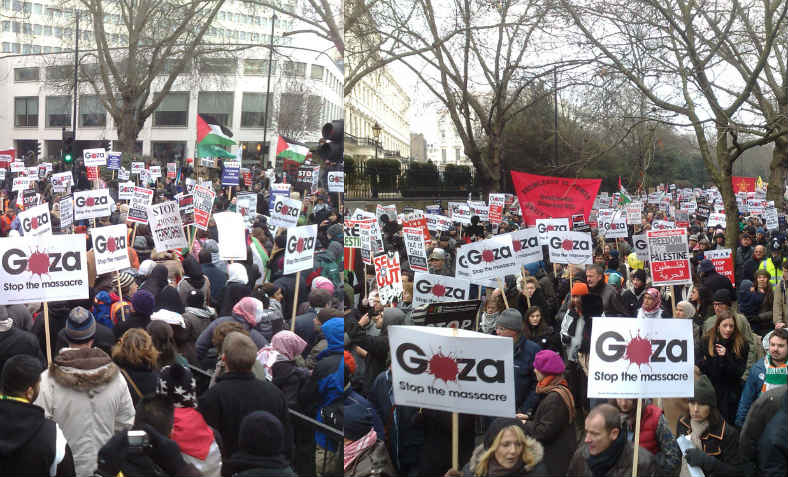 Stop bombing Gaza national demonstration, 10 January 2009. Photo: Flickr/STML
Stop bombing Gaza national demonstration, 10 January 2009. Photo: Flickr/STML
Ten years on since the massacre of Operation Cast Lead, conditions in Gaza are worse than ever, argues Shabbir Lakha
A decade ago, Israel launched a barbaric offensive on the Gaza strip, one of the most densely populated areas on the planet. The 22 day aerial, ground and sea assault killed over 1,400 Palestinians and wounded over 5,000.
The brutal attack included mass indiscriminate bombardment from F-16 jets and Apache helicopters, naval shelling, tanks and troops on the ground that razed whole villages to the ground. The people of Gaza were subjected to showers of white phosphorous, a banned chemical weapon that burns flesh at 3000 degrees. They were shot at with bullets cased in depleted uranium that, ten years later, continue to cause birth defects and cancer – something Israel refuses to let Gazans leave to receive treatment for.
As has become a standard when it comes to reporting about Palestine, this campaign of mass murder is often described as the Gaza “War”, and it’s justified as self defence in response to rocket attacks from Hamas. In reality, the UN recorded at least 8 violations of the ceasefire by Israel prior to the offensive, not including that one of the conditions of the ceasefire was ending the siege it had imposed since 2007 – which hadn’t been adhered to at all. The siege, which was carefully calculated by calorie to allow in just enough food to keep the population above the brink of malnourishment, was imposed as soon as Hamas assumed power in Gaza, despite Hamas adhering to the ceasefire and agreeing to negotiations.
Despite claiming that Operation Cast Lead was a response to Hamas rockets and because Hamas was refusing to negotiate another ceasefire (which was untrue), Israel later revealed that it had been planning the offensive for 6 months. The reality was that Israel provoked Hamas, and then used their retaliation as an excuse to launch the offensive for two reasons: to “send Hamas a message” and to attempt to recover the kidnapped soldier Gilad Shalit.
Since Operation Cast Lead, Israel launched Operation Pillar of Cloud in 2012 and Operation Protective Edge in 2014 – the deadliest yet, killing over 2,000, 500 of whom were children. Even in times of “peace” in between and since, there are regular airstrikes. Today in Gaza, 97% of the water is unfit for human consumption, there is only a few hours of electricity per day and huge areas remain rubble.
This is the background to the Great Return March that began earlier this year and has been continuing every Friday. Children in Gaza today have never known anything but the siege and regular attack. 70 years after the Nakba, where Palestinians were forced off their land and most of Gaza’s population is made of refugees from this event, Palestinians in Gaza are fighting for their right to return to their hometowns.
Solidarity with Palestine
When the bombing of Gaza began 10 years ago, Stop the War and other groups organised several national demonstrations in London to oppose the murder of Palestinians. On 10th January 2009, up to 100,000 people marched from Hyde Park to the Israeli Embassy in protest, which was a defining moment in the Palestine solidarity movement in Britain.
Testament to the growth and strength of the movement is the divestment of HSBC from Elbit systems, an Israeli arms company, on 27 December, the day that Cast Lead began ten years ago. BDS is growing and it’s winning in universities like Leeds, in companies like AirBnB and now HSBC, and culturally with artists refusing to perform in Israel.
Jeremy Corbyn, who spoke on the demonstration on 10th January 2009, is today the leader of the Labour Party and very possibly the next Prime Minister. Under his leadership, Labour has a policy of recognising Palestine and immediately ending arms sales to Israel.
Ten years on from this massacre, we must be louder and clearer in our solidarity with Palestine and for an end to the occupation, whether it’s through mobilising against the gunning down of peaceful protesters in Gaza, or campaigning to boycott Eurovision 2019 in Tel Aviv.

